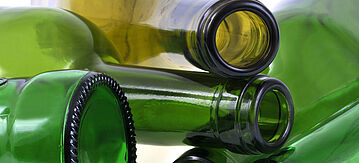Waste glass

Most waste glass is well suited to recycling as it can be melted down any number of times and made into new high-quality products. Compared with manufacturing new glass, glass recycling helps conserve raw materials and reduce energy consumption. For example, adding one percentage point of crushed glass, instead of exclusively using primary raw materials, reduces the amount of energy required in the melting process by around 0.2 to 0.3 percent. Recycling waste glass therefore protects the environment and is good for the climate because carbon emissions are reduced.
Used glass is usually recycled to make containers, for example, bottles and jars for food and drinks. In 2022, the recycled volume amounted to around 2.5 tonnes across Germany. Since collection began in the early 1970s, the amount of waste glass in glass production has continued to increase and today can reach up to 90 percent depending on the colour. Opaque glass or glass bottles containing metal, however, cannot be recycled.
Legislation
Container glass is used in particular in the food and beverage industry to sell products such as drinks, vegetables and yoghurt. It is usually used as sales packaging that subsequently accumulates as waste with the private end consumer. The glass is therefore subject to the system participation requirement stipulated in the German Packaging Act (VerpackG) of 5 July 2017, which has since been amended several times. This system participation requirement means that manufacturers of glass packaging must take part in one or more dual systems with this packaging to ensure nationwide take-back. Reusable glass packaging and single-use glass bottles with a deposit are exempt.
Separately collected waste glass is only recycled. Germany’s Packaging Act stipulates that from 1 January 2022, dual systems must ensure an annual average of at least 90 percent by weight of the glass packaging they collect is reused or recycled (previously 80 percent by weight). In 2022, around 2.5 million tonnes of glass from used packaging was recycled in Germany. This recovery rate amounts to 84.6 percent. An increase is still needed to meet the requirement of 90 percent by weight. Consumers can also make an important contribution here by always disposing of waste glass packaging in glass recycling containers, because only glass that has been separately collected can be recycled. However, broken drinking glasses or windowpanes, for example, should never be disposed of in such containers as they often differ in their chemical composition and disrupt or even prevent the recycling process. Helpful tips on correct disposal can be found under the following links:
